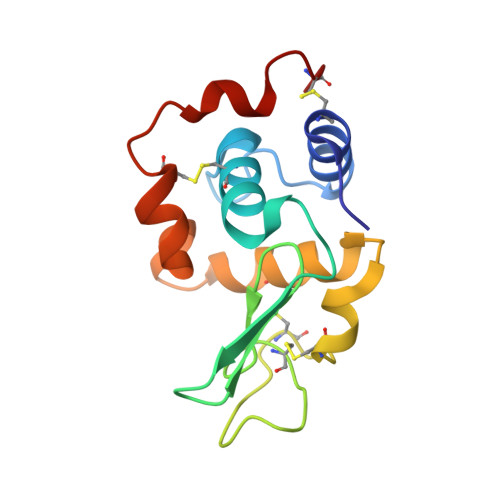Effect of foreign N-terminal residues on the conformational stability of human lysozyme.
Takano, K., Tsuchimori, K., Yamagata, Y., Yutani, K.(1999) Eur J Biochem 266: 675-682
- PubMed: 10561612
- DOI: https://doi.org/10.1046/j.1432-1327.1999.00918.x
- Primary Citation of Related Structures:
1C43, 1C45, 1C46 - PubMed Abstract:
To minutely understand the effect of foreign N-terminal residues on the conformational stability of human lysozyme, five mutant proteins were constructed: two had Met or Ala in place of the N-terminal Lys residue (K1M and K1A, respectively), and others had one additional residue, Met, Gly or Pro, to the N-terminal Lys residue (Met(-1), Gly(-1) and Pro(-1), respectively). The thermodynamic parameters for denaturation of these mutant proteins were examined by differential scanning calorimetry and were compared with that of the wild-type protein. Three mutants with the extra residue were significantly destabilized: the changes in unfolding Gibbs energy (DeltaDeltaG) were -9.1 to -12.2 kJ.mol-1. However, the stability of two single substitutions at the N-terminal slightly decreased; the DeltaDeltaG values were only -0.5 to -2.5 kJ.mol-1. The results indicate that human lysozyme is destabilized by an expanded N-terminal residue. The crystal structural analyses of K1M, K1A and Gly(-1) revealed that the introduction of a residue at the N-terminal of human lysozyme caused the destruction of hydrogen bond networks with ordered water molecules, resulting in the destabilization of the protein.
Organizational Affiliation:
Institute for Protein Research, Osaka University, Yamadaoka, Suita, Osaka, Japan.















